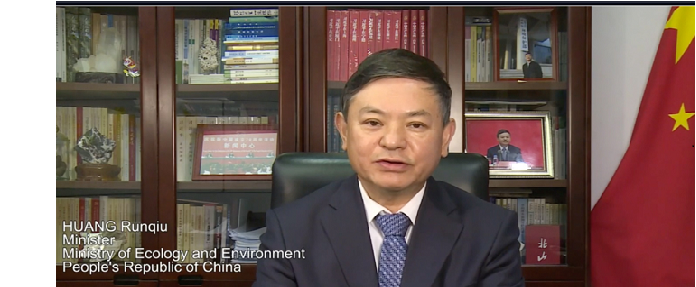
China’s environment minister outlines goals for 2024
| On 23 January, China’s ecology and environment minister Huang Runqiu outlined his department’s achievements in 2023 and priorities for 2024, in a 20,000 character-long (or approximately 14,000 word-long) speech. In the following, Carbon Brief translates and summarizes some of his key talking points. The speech was delivered at the ministry of ecology and environment (MEE) annual work conference – a meeting that looks at progress to date and priorities for the year ahead. Huang’s speech reflects on remarks made by President Xi Jinping at a major conference in July 2023, where Xi underscored the importance of “building a beautiful China”. It also outlines eight priorities that Huang’s department will pursue this year. CHINA’S APPROACH TO ENVIRONMENT PROTECTION IN 2024 On building an ecological civilisation: 2023 was a milestone year in the field of ecological environment. President Xi Jinping delivered an important speech which provides an action plan and scientific guidance for us to continue to promote the construction of ecological civilisation in a new era. On challenges to China’s emissions-cutting efforts: China’s industrial structure is still characterised by high energy consumption and high carbon emissions, coal consumption remains high, freight remains mainly powered by heavy goods vehicles [and] this year the economy will continue to rebound. Therefore, the pressure on emissions reduction efforts is not insignificant. On loss of ecosystems and pollution incidents: The overall quality of the ecosystem remains low and important ecological spaces continue to be crowded out. Prolonged periods of heavily-polluted weather occur occasionally, and ecological and environmental incidents are still frequent and high-risk. There are nearly 10,000 tailing ponds across the country, and historical stockpiles of solid waste total tens of billions of tonnes. On the need for more regulation: There are shortcomings in ecological and environmental science and technology support, insufficient use of market-oriented methods of environmental management [and] lags in construction of ecological and environmental infrastructure…In some places, ecological and environmental supervision is either superficial or has not been established. On timelines for near-term progress: By 2027, green and low-carbon development will be promoted in depth, total emissions of major pollutants will be continuously reduced, the quality of the ecological environment will be increased…and China’s ecological security will be effectively guaranteed. [The 2027 deadline is also a key target in recent opinions issued by China’s leadership to meet environmental protection goals under the ‘beautiful China initiative’.] On developing ‘green’ steel: In 2023 a total of 420m tonnes of crude steel production capacity saw a whole-process ultra-low emission transformation. On China’s national carbon market: The MEE promoted the successful conclusion of the second compliance cycle of the national carbon emissions trading scheme (ETS), which included 2,257 key emissions units in the power industry, covering more than 5bn tonnes of carbon dioxide (CO2) emissions annually. On politicisation of climate cooperation: Global ecological and environmental issues are increasingly politicised, with some western countries playing the climate card to introduce carbon tariffs and other policies. KEY TASKS FOR 2024 On promoting pilot zones for a ‘beautiful China’: China will implement the opinions on comprehensively promoting the construction of a beautiful China and construct beautiful China pioneer [pilot] zones. On maintaining the fight against pollution: The MEE will implement the action plan for continuous improvement of air quality and promote the ultra-low emission transformation of the iron and steel, cement and coking industries. On promoting ‘green, low-carbon and high-quality’ development: The MEE wiLL support high-quality development policies and measures for economic recovery and strengthen the environmental assessment services for major investment projects…prepare guidance on strengthening construction of the ETS, gradually expanding the coverage of industries…finalise a national greenhouse gas emissions factor database…study the EU’s carbon border adjustment mechanism…[and] promote implementation of the methane emission control action plan. On increasing supervision of ecological protection and restoration: China will fully implement the Kunming-Montreal Global Biodiversity Framework and further promote China’s biodiversity conservation strategy and action plan (2023-30). On ensuring nuclear and radiation safety: The MEE will continue to improve nuclear safety supervision systems and…strengthen capacity for forward-looking research and judgement. On strengthening ecological environment inspection, law enforcement and risk prevention: The MEE will implement the third round of central ecological environmental protection inspections. On promoting ecological environment innovation: The MEE will issue guidance on strengthening scientific and technological innovation in the field of ecology and environment to promote the construction of a beautiful China. On environmental governance and COP29: The MEE will continue deepening reform of vertical [policy] management system and accelerate construction of a credit system to supervise environmental protection. The MEE will cooperate on environment and climate change with key countries to promote positive outcomes at COP29. Source: China Briefing, 8 February 2024. https://www.carbonbrief.org/china-briefing-8-february-xis-green-call-renewables-to-top-coal-no-new-eu-solar-support/ |